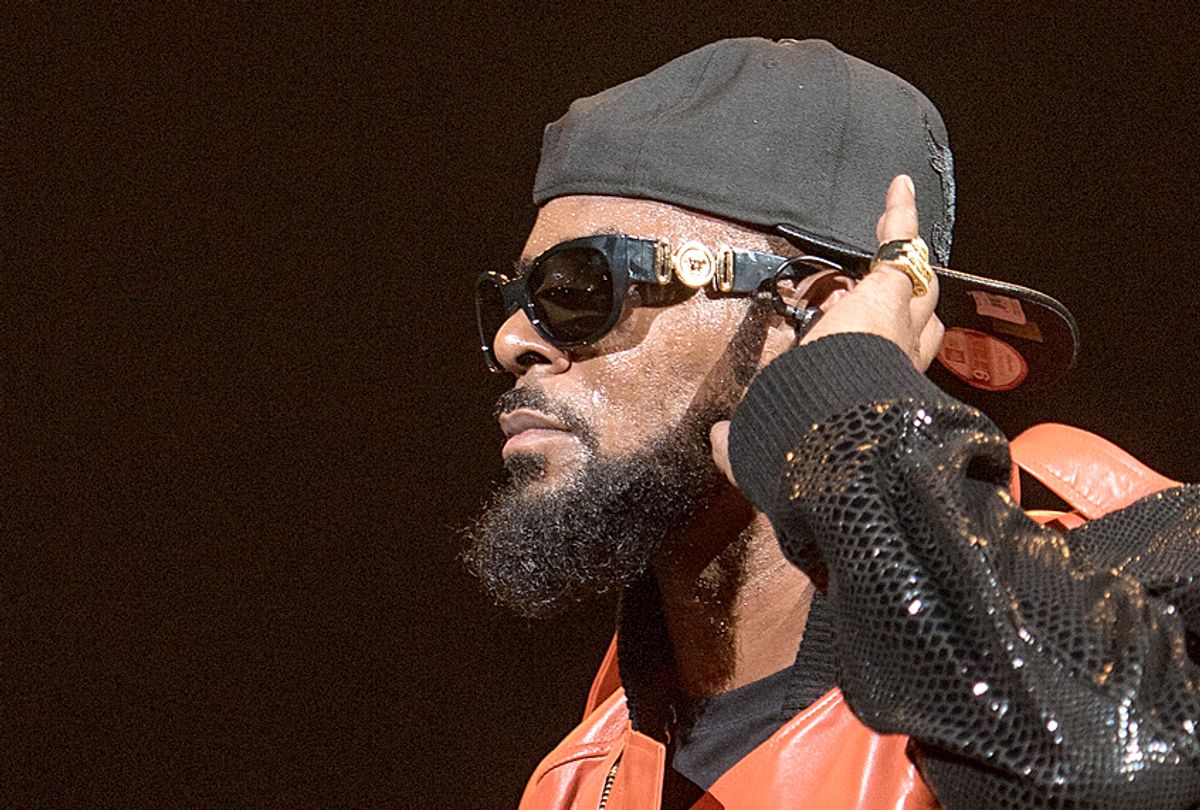The women of color within Hollywood's anti-sexual harassment initiative, Time's Up, announced Monday that they are joining the #MuteRKelly campaign, a social media hashtag and rallying call to end R. Kelly's career amid more than a dozen accusations of sexual violence.
"Over the past 25 years, the man known publicly as R. Kelly has sold 60 million albums, toured the globe repeatedly, and accumulated hundreds of millions of plays on radio and streaming services," the Time's Up letter said. "During this time, he also married a girl under 18 years of age; Was sued by at least 4 women for sexual misconduct, statutory rape, aggravated assault, unlawful restraint, and furnishing illegal drugs to a minor; Was indicted on 21 counts of child pornography; Has faced allegations of sexual abuse and imprisonment of women under threats of violence and familial harm."
From physical abuse to sexual assault, Kelly, 51, has always denied the allegations.
The letter also called for the corporations who partner and profit from Kelly's music to sever ties with him and join the #MuteRKelly campaign. This includes RCA Records, his label; Ticketmaster, which sells his tickets; Spotify and Apple Music, where his music is streamed and monetized; and Greensboro Coliseum Complex, where his next concert is scheduled on May 11. "With that said, we demand appropriate investigations and inquiries into the allegations of R. Kelly’s abuse made by women of color and their families for over two decades now," the letter added.
Hollywood's brightest stars like Ava Duvernay, Lena Waithe, Kerry Washington, Viola Davis and Shonda Rhimes, among many others, shared the letter on social media, demanding the "safety and dignity of all women." All of Kelly's alleged victims have been black and brown women and most of them have been low-income. Male entertainers like Questlove and John Legend have also amplified Time's Up's message.
The #MuteRKelly campaign was created last July by Oronike Odeleye and Kenyette Barnes and consists of demonstrating at Kelly's concerts and pressuring radio stations to stop playing his music. The movement also partnered with Care2 petitions to ask signees to "join us in telling Sony and Live Nation to #MuteRKelly for habitually preying on teenage girls for the past 25 years. Sign to tell Live Nation to cancel his upcoming shows and Sony to drop his recording contract!" The petition has garnered nearly 67,000 of its requested 70,000 signatures.
Over the weekend, Kelly was removed from the Love Jam concert, scheduled for May 5 in Chicago. In a video posted to his Twitter Sunday, he said, "I don’t know why they canceled the show. I’ve never heard of a show being canceled because of rumors, but I guess there’s a first time for everything."
Kelly's management team released a statement after the Time's Up announcement, saying that the singer supports "the pro-women goals of the Time's Up movement" but described the campaign against Kelly as "unjust and off-target."
The statement added that Time's Up "has neglected to speak with any of the women who welcome R. Kelly's support. . . Soon it will become clear Mr. Kelly is the target of a greedy, conscious and malicious conspiracy to demean him, his family and the women whom he spends his time with."
"Since America was born, black men and women have been lynched for having sex or for being accused of it. We will vigorously resist this attempted public lynching of a black man," the statement concluded.
As Bernice King, daughter of Rev. Dr. Martin Luther King Jr. said in response, it is "Irresponsible and dangerous to label work to magnify accusations of long-time predatory behavior and abuse levied by the voices of Black women and girls, who are often the last for whom society advocates, as an 'attempted public lynching of a black man.'"
I recently explored the mounting allegations against Kelly and the growing pressure for corporations and individuals to stop working with him and whether we may finally be entering a time in which the allegations against Kelly have become too thoroughly anchored in the public conscience for the music industry to continue to ignore it. His lawyer, publicist and executive assistant have reportedly resigned from their posts, and rapper Vince Staples called him a "child molester" during an on-air interview in California.
No matter how this saga ends, one thing that remains inseparable from Kelly's story is how long it has taken for nearly anyone but black women to notice.
For two decades, black women activists and writers were largely alone in calling for his ousting and for justice for his alleged victims. Just now is the rest of the world seemingly starting to catch up. "What if Tiffany, Tracy, Patrice, Montina and all the other unnamed girls like them were white?" Karen Attiah asked during an op-ed video for The Washington Post. "If even a fraction of the allegations against Kelly are true, his continued success hinges on the invisibility of black women and girls in America."



Shares